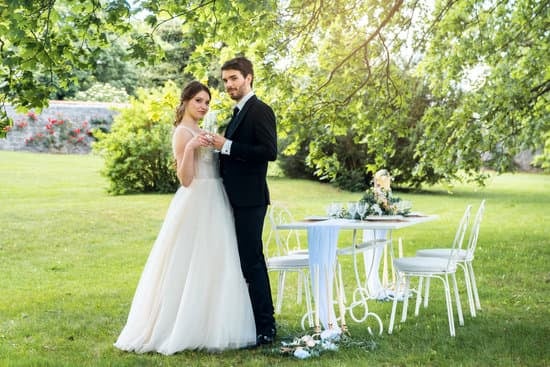Are you passionate about creating beautiful and unforgettable wedding experiences? Have you ever wondered how to be a wedding designer? In this article, we will explore the fascinating world of wedding designing, the essential skills and qualities needed to succeed in this industry, and the steps to take to officially become a professional wedding designer.
Wedding designing is a dynamic and creative field that allows individuals to use their artistic talents to curate magical moments for couples on their special day. From conceptualizing themes and color schemes to coordinating floral arrangements and decor, wedding designers play a crucial role in bringing the couple’s vision to life.
To excel in this industry, it is essential to possess certain skills and qualities. Creativity, attention to detail, strong communication and organizational skills, and the ability to work well under pressure are just a few traits that can contribute to success as a wedding designer. Additionally, having knowledge of design principles, trends in fashion and interior design, and an understanding of different cultural traditions can be advantageous in delivering exceptional wedding designs.
As we delve deeper into the world of wedding designing, we will discuss the responsibilities of a wedding designer, tips for creating an impressive portfolio, building a successful business in this field, networking within the industry, staying updated with current trends, and ultimately embarking on the rewarding journey of being a part of someone’s special day as a wedding designer.
The Essential Skills and Qualities Needed to Become a Successful Wedding Designer
Becoming a successful wedding designer requires a unique combination of skills and qualities that enable you to understand and meet the specific needs and desires of your clients. Here are some essential skills and qualities needed to excel in this field:
1. Creativity: As a wedding designer, creativity is key. You must be able to think outside the box and come up with innovative ideas for creating breathtaking and unique wedding designs.
2. Attention to Detail: Every aspect of a wedding design, from the color scheme to the floral arrangements, must be carefully considered. Having an eye for detail will ensure that every element of the design comes together seamlessly.
3. Strong Communication Skills: Building strong relationships with clients, vendors, and other industry professionals is crucial in the world of wedding designing. Effective communication will allow you to understand your client’s vision and bring it to life.
4. Time Management: Coordinating all aspects of a wedding design requires exceptional time management skills. You must be able to prioritize tasks, meet deadlines, and handle multiple projects simultaneously.
5. Knowledge of Design Principles: Understanding design principles such as color theory, balance, and proportion is essential for creating visually stunning wedding designs.
By cultivating these skills and qualities, you will be better equipped to tackle the challenges of being a wedding designer and deliver exceptional results for your clients.
Steps to Take to Officially Become a Professional Wedding Designer
Becoming a professional wedding designer requires a combination of education, training, and hands-on experience. To officially become a professional in the industry, there are several important steps that one should consider taking.
First and foremost, obtaining a formal education in design or related fields is crucial. Many successful wedding designers have a background in interior design, fashion design, or event planning. Pursuing a degree or certification from a reputable institution will provide you with the necessary knowledge and skills to excel in this competitive field.
After completing your education, gaining practical experience through internships or entry-level positions with established wedding designers or event planning companies is highly recommended. This will allow you to learn directly from professionals in the industry, build your portfolio, and make valuable connections.
In addition to formal education and hands-on experience, obtaining relevant certifications and licenses can further solidify your credibility as a professional wedding designer. Depending on your location, there may be specific requirements or regulations for practicing as a wedding designer, so be sure to research and comply with any necessary legalities.
Moreover, continuing education is essential for staying current with trends and techniques within the wedding industry. Consider attending workshops, seminars, and conferences relevant to wedding design to expand your knowledge and skill set.
| Steps | Details |
|---|---|
| Formal Education | Pursue a degree or certification in design or related fields |
| Gain Practical Experience | Internships or entry-level positions with established professionals |
| Obtain Certifications/Licenses | Research and comply with legal requirements for practicing as a wedding designer |
| Continuing Education | Attend workshops, seminars, and conferences relevant to wedding design |
Understanding the Role of a Wedding Designer and Their Responsibilities
The role of a wedding designer is vital in creating an unforgettable experience for the bride and groom on their special day. From the decorations to the overall ambiance, a wedding designer is responsible for bringing the couple’s vision to life. This section will delve into the specific responsibilities and duties that a wedding designer must fulfill to ensure that every aspect of the event is meticulously planned and executed.
Creating a Concept
One of the main responsibilities of a wedding designer is to work closely with the couple to understand their vision for their big day. This involves brainstorming and conceptualizing ideas that reflect the couple’s unique style and preferences. It requires a keen eye for detail, creativity, and an ability to bring together different elements cohesively.
Vendor Coordination
A successful wedding design also entails collaborating with various vendors such as florists, caterers, and rental companies. The wedding designer must be adept at networking and forming working relationships with these professionals to ensure that each component aligns with the overall design concept. Effective communication and negotiation skills are essential in managing these partnerships.
On-Site Installation
On the day of the wedding, a wedding designer oversees the set-up and installation of all design elements. This includes but is not limited to centerpieces, lighting, signage, and any other decorative features. Attention to detail, time management, and problem-solving skills are crucial during this phase to ensure that everything runs smoothly.
Being a successful wedding designer goes beyond creativity – it involves meticulous planning, strong interpersonal skills, and most importantly, a passion for making dreams come true on one of life’s most significant occasions. By understanding the various aspects of this role and its responsibilities, aspiring designers can embark on their journey equipped with the knowledge needed to excel in this field.
Tips for Creating a Stunning Wedding Design Portfolio
To become a successful wedding designer, creating a stunning portfolio is crucial. Your portfolio will showcase your unique style, creativity, and design skills to potential clients. Here are some tips on how to create an impressive wedding design portfolio:
- Include a variety of work: Your portfolio should include a diverse range of wedding designs that highlight your versatility as a designer. Include examples of different wedding themes, color palettes, and décor styles to demonstrate your ability to cater to various client preferences.
- High-quality images: The key to an eye-catching portfolio is high-quality images of your work. Invest in professional photography or enlist the help of a skilled photographer to capture the details of your designs. Clear and beautiful images will showcase the intricacies of your work and leave a lasting impression on potential clients.
- Tell a story: Arrange your portfolio in a way that tells a cohesive story about your designs. Start with an engaging introduction that reflects your design philosophy, followed by individual projects that showcase your creativity and attention to detail. This will give potential clients insight into your design process and approach.
- Client testimonials: Including client testimonials in your portfolio adds credibility to your work and builds trust with potential clients. Share feedback from past couples about their experience working with you and how you brought their vision to life.
By following these tips, you can create a visually captivating wedding design portfolio that effectively showcases your talent and expertise as a wedding designer.
Building a Successful Wedding Designing Business and Attracting Clients
Creating a Professional Brand
One of the first steps in building a successful wedding designing business is to create a strong and professional brand. This includes developing a cohesive brand identity that reflects your style and aesthetic as a designer. Your brand should be consistent across all platforms, from your website and social media profiles to your business cards and promotional materials.
Marketing Your Services
Once you have established your brand, it’s important to focus on marketing your services to attract clients. This can include creating an online presence through social media and a professional website, as well as traditional forms of advertising such as bridal shows or print advertisements. Networking within the wedding industry and forming partnerships with other vendors can also help to increase your client base.
Providing Exceptional Service
In addition to effectively marketing your services, providing exceptional customer service is crucial for attracting and retaining clients. Building strong relationships with couples and their families throughout the wedding planning process can lead to referrals and positive reviews, which are essential for growing your business.
As a wedding designer, understanding how to be a wedding designer also involves continuous learning and staying updated with the latest trends in the industry in order to offer fresh ideas and designs to your clients. By following these strategies, you can build a successful wedding designing business while attracting clients who appreciate your unique vision and expertise.
The Importance of Networking and Building Relationships Within the Wedding Industry
The wedding industry is built on relationships, and as a wedding designer, it is crucial to understand the importance of networking and building strong connections within the industry. Networking not only helps you to establish your presence in the market but also opens doors for potential collaborations, new opportunities, and referrals. Building relationships with other professionals in the industry can lead to partnerships with vendors, venues, and other wedding planners, which can significantly benefit your business.
One of the best ways to network within the wedding industry is by attending industry events such as bridal shows, wedding fairs, and networking mixers. These events provide a great opportunity to meet with other professionals in the field including photographers, florists, caterers, and event planners. Additionally, joining professional organizations such as the Association of Bridal Consultants or the International Live Events Association can also help you expand your network and stay updated on industry trends.
Another important aspect of building relationships within the wedding industry is maintaining good communication and professionalism. This involves delivering exceptional service to clients while working collaboratively with other vendors. By establishing a good reputation and fostering positive relationships with others in the industry, you can increase your chances of obtaining referrals from past clients and colleagues alike.
It’s important for wedding designers to approach networking with sincerity and authenticity. Building genuine friendships and professional connections will not only help you grow your business but also create a supportive community that can provide valuable guidance and encouragement throughout your career as a wedding designer.
| Networking | Benefits |
|---|---|
| Establishing presence in market | New opportunities |
| Partnerships with vendors | Referrals from colleagues |
Keeping Up With the Latest Wedding Design Trends and Staying Relevant in the Industry
Staying updated with the latest wedding design trends is crucial for any aspiring wedding designer. The wedding industry is constantly evolving, and clients are always looking for fresh and innovative ideas for their special day. Keeping up with the latest trends not only helps in staying relevant in the industry but also showcases a designer’s adaptability and creativity.
One way to stay informed about the current wedding design trends is to attend industry events such as bridal shows, networking mixers, and conferences. These events provide a great opportunity to connect with other professionals in the industry, learn from expert speakers, and get inspired by new ideas and concepts. Additionally, it’s important to keep an eye on popular wedding blogs, magazines, and social media platforms to stay updated on what’s trending in the world of weddings.
Another vital aspect of staying relevant in the industry is continuously honing your craft as a wedding designer. This may involve taking courses or workshops to learn about new techniques, styles, or technologies that can enhance your design capabilities. It’s also important to be open to feedback from clients and peers, as this can help you identify areas for improvement and growth in your work.
In addition to staying updated with current trends, it’s essential for wedding designers to maintain their own unique style and aesthetic. While being aware of popular trends is important, having a distinct design perspective will set you apart from other designers. Clients often seek out designers who can bring their own creative vision to life while incorporating elements of current trends. Balancing staying relevant with maintaining individuality is key in the competitive world of wedding designing.
Conclusion
In conclusion, becoming a wedding designer is a rewarding journey that offers immense opportunities for creativity, entrepreneurship, and personal fulfillment. The essential skills and qualities needed to succeed in this field include creativity, attention to detail, excellent communication skills, and the ability to work under pressure. By following the steps outlined to officially become a professional wedding designer and understanding the responsibilities of the role, aspiring designers can pave their way into the industry.
Creating a stunning wedding design portfolio is crucial for attracting clients and showcasing one’s unique style and vision. Building a successful wedding designing business involves effective marketing strategies, exceptional client service, and staying updated on the latest wedding design trends. Networking within the wedding industry is also essential for building relationships with vendors, other professionals, and potential clients.
In today’s ever-evolving world of weddings, staying relevant as a wedding designer requires keeping up with the latest trends and innovative designs. By continually seeking inspiration, learning new techniques, and adapting to changing preferences in the industry, wedding designers can continue to thrive in this competitive but fulfilling field.
Overall, being a wedding designer offers not only creative expression but also the opportunity to be part of one of life’s most special moments-the celebration of love and commitment between two individuals.
Frequently Asked Questions
What Is a Wedding Designer Called?
A wedding designer is commonly referred to as a wedding planner or wedding coordinator. They are responsible for designing and organizing all aspects of a couple’s wedding day, from the venue decoration to the timeline of events.
What Degree Should I Get to Be a Wedding Planner?
To become a wedding planner, there is no specific degree required. However, many professionals in this field have degrees in event planning, hospitality management, marketing, or public relations. These degrees provide the knowledge and skills needed for managing weddings and events successfully.
Is Wedding Planning a Good Career?
Wedding planning can be a fulfilling and rewarding career for those who are passionate about creating memorable experiences for couples on their special day. It offers flexibility, creativity, and the opportunity to work closely with clients to bring their vision to life.
However, it also requires strong organizational skills, attention to detail, and the ability to handle stressful situations effectively. Overall, it can be a good career choice for individuals who thrive in fast-paced environments and enjoy working with people during important milestones in their lives.

I have been involved in marriages for over 20 years helping couples and singles understand more about them.





